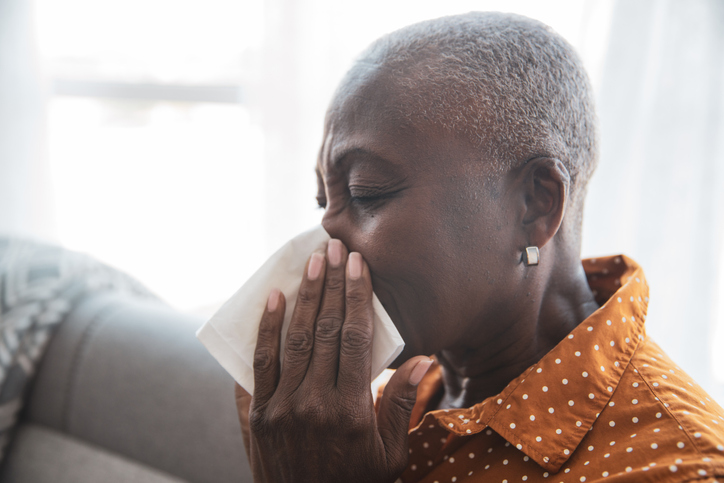Fall is here, temperatures are getting cooler, the holiday season is on its way, and unfortunately, we’ve also entered flu season. Cases of the flu tend to accelerate at this time of year, sometimes starting off seeming like nothing more than a common cold. Unlike a cold, though, the flu can result in devastating consequences, especially among senior citizens. As many as 90 percent of deaths by flu each year are in adults over 65, so if you’re a senior, it’s especially important to protect yourself. Fortunately, there are some very effective ways to do that. Let’s take a look at what the flu actually is, then talk about some ways to avoid it.
The flu is actually a nickname. The illness is really called influenza, and it’s a respiratory illness that ranges from mild to extremely severe. It’s caused by the influenza virus, which infects humans and other creatures, like mammals and birds. The three main types of influenza strains are influenza A, which is the most common type, influenza B, which is responsible for about 20 percent of flu infections. And influenza C, which is the mildest type of influenza. All three types of flu cause similar symptoms:
- Cough
- Runny Nose
- Fever
- Sore Throat
- Chills
- Muscle Aches or Cramps
- Headaches
- Stomach Problems Like Diarrhea and Vomiting
Sometimes, you can have these symptoms without having the flu. It may just be the common cold. The difference between the common cold and the flu, though, is that a cold rarely gets worse than a stuffy nose and a mild fever. Additionally, a cold usually lasts only a few days. If your illness drags on for more than two or three days or involves severe symptoms like a persistent headache or vomiting, see a doctor immediately to determine if it’s the flu.
The reason it’s important to see a doctor if you’ve got the flu is that, especially for people over 65 years of age, the flu can come with complications. With the right treatment, the flu only lasts about two weeks. Complications from the influenza virus, however, can last much longer. If you’ve got an underlying condition like diabetes, obesity issues, kidney, liver or heart problems, asthma, chronic lung disease, or any illness or medication that weakens the immune system, you’re at a higher risk of complications. These complications can weaken the immune system, which puts seniors at higher risk of severe problems like long hospitalization or even death. Problems seniors can face with the flu include:
- Pneumonia: This is a bacterial respiratory illness that causes chest pain, coughs, shaking, and sweating, along with lower than normal temperatures. Pneumonia is the fourth leading killer of seniors, who are at greater risk of developing and dying from pneumonia than any other demographic. It may be prevented with a pneumonia vaccine.
- Bronchitis: An inflammation of the lungs, bronchitis is caused by a respiratory issue like the flu. The main symptom of this condition is a cough due to lung irritation and mucus. Some types of bronchitis clear up in two or three weeks, while chronic bronchitis comes back long after the flu has left your system.
- Sinus and Ear Infections: The flu can make your body more vulnerable to infections.
- Dehydration: This is a serious issue for older people, particularly when they’re ill. Seniors have less water in their bodies than young people, so dehydration can set in quickly with symptoms like sweating, vomiting, and a runny nose. Dehydration can result in potentially fatal medical issues like seizures and kidney problems.
- Heart Failure: Heart attacks and other heart issues can happen more frequently after the flu, because of your body’s reduced resistance to bacteria and other harmful substances.
Flu season begins in September or October and ends some time around May. The flu is spread through respiratory droplets left in the air when someone coughs, sneezes or talks, and also by contact with surfaces contaminated by the virus. A person can have the flu without showing symptoms for up to four days and can remain contagious for up to a week after showing symptoms. While the flu can be treated, it’s best to protect yourself so that you don’t get the flu in the first place. How can you accomplish this?
First, lead a healthy lifestyle. Our immune systems get less effective as we age, but there are things you can do to strengthen yours. Eat a well-balanced, nutrient dense diet, get the proper rest, and keep your hands and surroundings clean. The other major preventive measure against the flu is getting the flu shot. For people over 50, getting the flu shot reduces the risk of hospitalization by 57 percent! It’s important to get your other vaccines as well, protecting yourself from problems like pneumonia and meningitis. This year, as we navigate the reality of COVID-19, it’s especially important to be vaccinated against other common illnesses and it’s particularly vital to avoid other respiratory ailments. If you do begin to feel ill, seek immediate help. Catching health concerns earlier makes it easier to resolve them as well as helping you to keep from spreading viruses.
At Parkwood Heights, the health and happiness of our residents is at the top of our priority list. That’s one of the reasons this is a great place to live your best life. A lovely community in which to spend your retirement, Parkwood Heights is located just minutes from Victor, Fairport, Farmington, and Canandaigua. Our picturesque, 122-acre senior living campus affords many opportunities to enjoy your time, whether you’re taking a walk on the expansive campus, joining in a game of bocce or horseshoes, or just enjoying our scenic setting. Call (315) 986-9100 to learn more about all that we have to offer, or check out our website and reach out if you have any questions.






